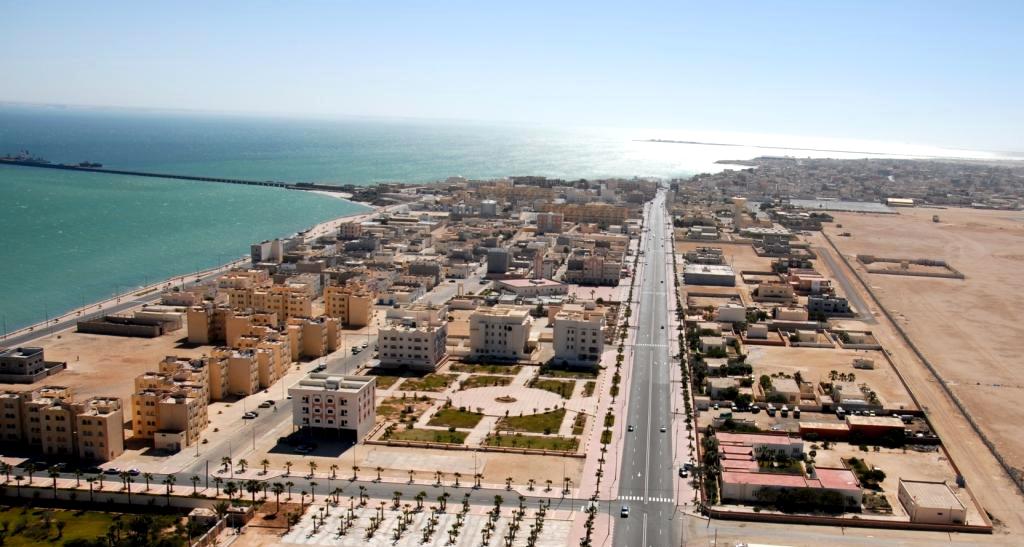Updated
Western Sahara: Who Should Vote, Part V – Bargaining Forward – Robert M. Holley

Bustling Dakhla — where the Sahara meets the Sea — is a center of commerce, culture, and tourism in Morocco’s southern provinces. MOTM
Robert M. Holley
January 31, 2018
In the first blog of this series, I raised the issue of whether the international community had been sufficiently inclusive in its original efforts to resolve the continuing dispute over the issue of sovereignty in Western Sahara, suggesting that tens of thousands of fully legitimate stakeholders, albeit non-Sahrawi, had not been allowed a rightful place in the process. In the last installment, I suggested that perhaps the time has come to take meaningful steps moving forward to implement Morocco’s autonomy initiative, with or without the participation of Algeria and the Polisario. In this episode, I would like to combine those ideas and carry the story a bit further.
Morocco’s 2007 autonomy initiative for the Sahara was not constructed without antecedents. A closer examination of the initiative will reveal that it bears much in common with James Baker’s first autonomy proposal at the UN, which he called his “Framework Agreement.” That first proposal was welcomed by Morocco, but rejected by Algeria and the Polisario. However, the 2007 Moroccan proposal goes beyond Baker’s original framework and adds substantial detail to the basic architecture. In 2003, then President George Bush suggested to King Mohamad VI, in a private meeting on the margins of the annual UN General Assembly session, that if Morocco was unhappy with Baker’s second proposal, his radically different and wholly unacceptable “take-it-or-else” ultimatum, which Baker called his “Peace Plan,” then the Kingdom should table something of its own in its place.
Morocco accepted that challenge and made its own private proposal a few months after the meeting with President Bush (vetted and commended by the State Department and the National Security Council) that Baker ultimately refused to consider. In fact, two such proposals were constructed, the first was a fleshing out of Baker’s original “Framework Agreement” and a second proposal some weeks later that sought to simply amend the more objectionable elements of Baker’s “ultimatum proposal.” Both Moroccan offers were serially refused by Baker. That refusal and President Bush’s solidarity with Morocco’s initiative and goodwill effort to reach a reasonable political compromise following the President’s suggestions ultimately led to the Security Council rejection of Baker’s “Peace Plan” ultimatum and soon after to Baker’s resignation as the UN Personal Envoy for the issue.
Following the conclusion of the tense relationship between Morocco and Baker throughout much of 2003 and early 2004, Morocco further elaborated the private proposal it had made to Baker’s Framework Agreement, which ultimately became the 2007 Moroccan Autonomy Initiative, and began a process of seeking to build a domestic political consensus around the initiative among Morocco’s various political constituencies prior to its presentation to the Security Council. That process led to the creation of a Royal Commission called CORCAS, a kind of appointed consultative assembly of the various elements of Sahrawi society in the Sahara. Among the region’s Sahrawi population, it was widely drawn and inclusive, but not elected, which drew later criticism from some in the community — even though the initiative it eventually endorsed enjoyed widespread approval among Saharan Moroccans. It was this body that gave assent to Morocco’s 2007 initiative in the name of Sahrawi’s resident in the territory.
But if Morocco is to move on today to begin to flesh out the particulars of its Autonomy Initiative and begin to break the international logjam through an initial bargain with the “concerned population” of the territory, as I suggested in the last episode, it would be well advised not to limit the bargaining process in the Sahara to the standing CORCAS commission. As inclusive as it is, CORCAS is still an appointed body and does not include the very substantial and differentiated constituencies among the region’s now long established non-Sahrawi residents with fundamental stakes in the outcome. So what is the alternative?
Since the new Moroccan Constitution of 2011 was ratified in a national referendum, and the country has promulgated the new law on advanced regionalization, there have been both national and local elections deemed free and fair by the international community. Those elections enjoyed high voter participation in the Sahara among both Sahrawis and other Moroccans long resident in the territory to both national and local offices. Here I think we have the makings of a legitimate group of fairly representative elected officials at both national, regional, provincial and community levels that could constitute a legitimate and elected group from which to draw a bargaining team to engage national authorities in an effort to further complete the architecture and internal specifics of a final future autonomy agreement for the territory.
Beginning this bargaining process now between the central authorities in Rabat and all elements of the concerned local population would not foreclose the possibility of future discussion with the Polisario, if its leadership ever has a change of heart, but it would help establish a baseline that legitimately represents a majority consensus for what the finished agreement should look like before being put to a vote of the whole of the “concerned population” of the region.
And if the Polisario refuses to participate beyond the conclusion of such a process, other options could be opened by taking these steps now.
As I have suggested previously in this series, it is likely time that Morocco take the initiative to break the logjam that the international community seems too content to tolerate, despite occasional protestations to the contrary. Polisario and Algerian intransigence should not be continually rewarded. It is my firm conviction that the local population would welcome an initiative from Rabat to move this issue forward, alone if necessary.
More to come.
View previous entries in the “Western Sahara: Who Should Vote” series here:
Part 1: http://bit.ly/2rhrmZA
Part 2: http://bit.ly/2Db7w3w
Part 3: http://bit.ly/2DnRCGe
Part 4: http://bit.ly/2nvfrCa